| Franklin Delano Roosevelt, the thirty-second President of the United States (1933-45), was the only United States President to be elected to four terms. FDR, as he was called, served during the worst times in the history of the United States, including the Great Depression and World War II.

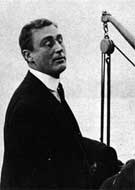 Born January 30, 1882 in Hyde Park, New York, his uncle was the former President, Theodore Roosevelt. His mother, Sarah Delano, was his father's second wife, and she could trace her ancestry back to the Plymouth Colony. As the only son of a wealthy family, Franklin first attended the prestigious Groton School, where his sense of social responsibility was formed, and then went on to Harvard. He was only an average student, but during his senior year was the editor of the elite Harvard Crimson (the student paper). Born January 30, 1882 in Hyde Park, New York, his uncle was the former President, Theodore Roosevelt. His mother, Sarah Delano, was his father's second wife, and she could trace her ancestry back to the Plymouth Colony. As the only son of a wealthy family, Franklin first attended the prestigious Groton School, where his sense of social responsibility was formed, and then went on to Harvard. He was only an average student, but during his senior year was the editor of the elite Harvard Crimson (the student paper).
He graduated in 1903 and went on to Columbia Law School (1904-07), but he dropped out upon his admission to the New York State Bar Association in 1907. On March 27, 1905, he had married Eleanor Roosevelt, a distant cousin. As a young woman, Eleanor was shy, but she grew into one of the most prominent first ladies of this nation. In the latter part of her life she worked for social betterment, and she was highly regarded as a lecturer and newspaper columnist. From 1949 to 1952 she served as a United States delegate to the United Nations.

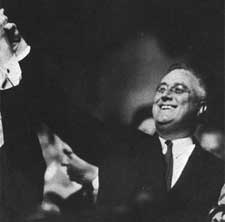 Franklin Roosevelt was elected to the New York Senate in 1910. His first elected public office was State Senator from the Hudson River District. At this time, he became a Democrat, despite the fact that his Uncle Teddy was a Republican. During the bitter fight for President in 1912 he supported Woodrow Wilson. In 1913, President Wilson appointed him Assistant Secretary of the Navy under Josephus Daniels. This is where he got the reputation as an elitist and a dandy (a finely dressed man) that followed him throughout his career. In 1920 he was the Vice Presidential candidate on a ticket with James Cox. They lost to Warren G Harding. Franklin Roosevelt was elected to the New York Senate in 1910. His first elected public office was State Senator from the Hudson River District. At this time, he became a Democrat, despite the fact that his Uncle Teddy was a Republican. During the bitter fight for President in 1912 he supported Woodrow Wilson. In 1913, President Wilson appointed him Assistant Secretary of the Navy under Josephus Daniels. This is where he got the reputation as an elitist and a dandy (a finely dressed man) that followed him throughout his career. In 1920 he was the Vice Presidential candidate on a ticket with James Cox. They lost to Warren G Harding.
While in his thirties Roosevelt, vacationing at his summer home on Campobello Island, suffered an attack of poliomyelitis. For the rest of his life, he was unable to walk without assistance. Inspired by his own experience with the illness, he would later found the March of Dimes to raise money for research into a cure for polio, as well as a national foundation at Warm Springs, Georgia for its treatment. FDR, himself, underwent treatment at this facility. His mother was the matriarch of the family and encouraged him, in her usual dominating manner, to retire to his home in Hyde Park and live his life contently there. Instead, he and Eleanor went against the grain. Eleanor, with the help of his trusted aide Louis McHenry Howe, assisted Franklin in keeping active in the Democratic Party. Franklin's mother was not happy at her lack of control, and she often took out her wrath on Eleanor.
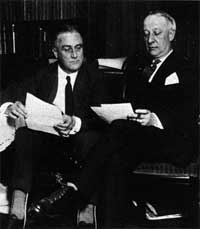 At the Democratic National Convention of 1924, Franklin Roosevelt finally made a return to the political stage. He was given the honor of placing Alfred Smith as the nominee for President of the United States. In his nomination speech, he referred to Smith as "The Happy Warrior." Franklin's delivery was masterful, and the speech gathered the Democrats behind Smith, who upon securing the nomination, strong-armed Roosevelt into running for Governor of New York. Smith had hoped that Roosevelt's appeal to the Protestants of rural New York would help him to carry the state in the election. At the Democratic National Convention of 1924, Franklin Roosevelt finally made a return to the political stage. He was given the honor of placing Alfred Smith as the nominee for President of the United States. In his nomination speech, he referred to Smith as "The Happy Warrior." Franklin's delivery was masterful, and the speech gathered the Democrats behind Smith, who upon securing the nomination, strong-armed Roosevelt into running for Governor of New York. Smith had hoped that Roosevelt's appeal to the Protestants of rural New York would help him to carry the state in the election.
Smith lost the race for President to Herbert Hoover, but Roosevelt did become Governor of New York, although by a narrow margin, proving to all that, despite his health, he could manage a strong campaign. While Governor, he initiated various welfare reforms, the development of public power, and civil service reforms. He also began to have serious Presidential aspirations. He met with a group of trusted advisors, many of them prominent new Yorkers, whose purpose was to brainstorm ideas that might put the nation back on its feet and, at the same time, quietly position FDR with a Presidential image. Reelected in 1930, he began to use the radio as a means of contact with the people. Roosevelt was still Governor of New York when he first mounted his campaign for the White House. During the National Convention he promised the delegates a " New Deal." That terminology was forever linked to his presidency and is a great part of United States history.
Roosevelt gathered together a "Brain Trust" from New York's Columbia University. The group was formed prior to the Chicago Convention and included Raymond Mosley (a law professor), Rexford Tugwell (agriculture economist), and A. A. Berle, Jr. (a specialist in corporate structure and finance). These men provided Roosevelt with a specific platform on which to run his campaign. He began to speak of "an economic constitutional order," which included conservation, relief, social insurance, and cheaper electricity. The Great Depression helped give him an overwhelming victory in the general election. His opponents criticized his physical limitations, but he used his powers of persuasion and charm. Some say that had there been television back then, a man in a wheelchair would never have been elected President of the United States; but Franklin was able to make voters forget his disability.

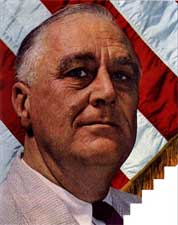 He became President in March of 1933 at one of the worst points of the Great Depression. On the eve of his inauguration he inspired confidence with the people when he told them " The only thing we have to fear is fear itself." Roosevelt began by winning the confidence of ordinary Americans through regular "fireside chats" on the radio. He asked them to stop hoarding cash, and on his first day as President he closed the Banks and ordered the Congress into special session to pass emergency banking legislation. It was a crisis situation. Between 12 and 14 million people were unemployed, and many were actually starving. In response, FDR recommended passage of programs such as the Works Progress Administration (WPA) that provided building projects, built schools and public buildings; the Civil Concentration Corps [CCC], wherein unmarried men built roads and public projects under the direction of the Army; and The Tennessee Valley Authority (TVA), formed to build dams and hydroelectric plants for electricity and flood control on rivers. The Agricultural Adjustment Acts of 1933 and 1938 promoted reforestation and conservation and controlled supply and demand by paying farmers not to plant certain crops. He became President in March of 1933 at one of the worst points of the Great Depression. On the eve of his inauguration he inspired confidence with the people when he told them " The only thing we have to fear is fear itself." Roosevelt began by winning the confidence of ordinary Americans through regular "fireside chats" on the radio. He asked them to stop hoarding cash, and on his first day as President he closed the Banks and ordered the Congress into special session to pass emergency banking legislation. It was a crisis situation. Between 12 and 14 million people were unemployed, and many were actually starving. In response, FDR recommended passage of programs such as the Works Progress Administration (WPA) that provided building projects, built schools and public buildings; the Civil Concentration Corps [CCC], wherein unmarried men built roads and public projects under the direction of the Army; and The Tennessee Valley Authority (TVA), formed to build dams and hydroelectric plants for electricity and flood control on rivers. The Agricultural Adjustment Acts of 1933 and 1938 promoted reforestation and conservation and controlled supply and demand by paying farmers not to plant certain crops.
During Roosevelt's presidency; the gold standard was abandoned and the Social Security Act introduced. The Social Security Act provided unemployment compensation, retirement funds, and disability insurance on a national scale. The dollar was devalued to stimulate foreign trade and to support more competitive business practices. As part of the New Deal, aid and assistance were provided to farms and businesses. The National Industrial Recovery Act (NIRA) was passed to stabilized industry by eliminating cutthroat practices, maintaining prices, and promoting labor unionization. The United States Supreme Court claimed that the NIRA and the Agricultural Adjustment Acts were unconstitutional. In 1938 Roosevelt had Congress pass another AA Act that did fit the Supreme Court's Standards. Employment for the unemployed and "a chicken in every pot" were the themes of the times. Many critics called the programs socialistic and said they were creating a welfare state funded by the government. Roosevelt's social welfare platform created federal deficits never seen before in this country.
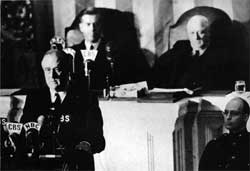 Roosevelt defeated Hoover for a second term and, for an unprecedented third term, he defeated Wendell Wilkie. Finally, in a fourth run, he defeated Thomas Dewey. Franklin Delano Roosevelt has been called the greatest President since Lincoln. But he is also highly criticized, especially for circumventing Congress and even his own Cabinet to get his programs through. He would constantly employ the use of radio and his now famous "fireside chats" to talk directly to the American people. Roosevelt defeated Hoover for a second term and, for an unprecedented third term, he defeated Wendell Wilkie. Finally, in a fourth run, he defeated Thomas Dewey. Franklin Delano Roosevelt has been called the greatest President since Lincoln. But he is also highly criticized, especially for circumventing Congress and even his own Cabinet to get his programs through. He would constantly employ the use of radio and his now famous "fireside chats" to talk directly to the American people.
Roosevelt foresaw the coming of the war that began in Europe in September of 1939. He kept playing cards with foreign policy, finding ways to aid the Allies against the Axis Powers. He advocated preparedness. Hitler was smashing his way through Europe, one country at a time, until he finally took France. In an overt gesture that broke the United State's neutrality, Roosevelt gave warships to the British, docking them in ports in the West Indies. Soon after this he introduced legislation to the Congress called the Lend-Lease Act. Under this act, the Allied countries could trade leased foreign bases for supplies and ships under a cash and carry arrangement that would have materials delivered to their ports by American ships. Soon America's factories were again humming, and war materials flowed to the Allies in huge numbers.
Many of the American people did not want to enter into another war. Like the public, Roosevelt and his staff were divided on the matter; but the less-than-neutral actions of the United States with regard to shipping made for deteriorating relations with the Axis powers. The decision to enter the war was made for the US when on December 7, 1941, the Japanese Navy bombed the American fleet at Pearl Harbor. Hitler then also declared war on the United States. This truly was a world war to end all wars. When Roosevelt spoke of the attack in his address to Congress on December 8, 1941, he called it "A day that will live in infamy." Yet Roosevelt had been eager for the United States to enter The War on the behalf of the Allies, and some argue he welcomed the Japanese attack as the excuse he needed. Roosevelt mobilized for war by enacting Woodrow Wilson's Selective Service Act, which created a draft to secure men for armed forces, and the War Production Board, which consolidated industry for the production of war materials on a massive scale.
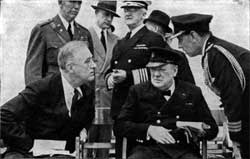 Roosevelt and Britain's Prime Minister, Winston Churchill, planned all aspects of the war with unity and purpose. Their first mission was to annihilate Hitler and force Germany into an unconditional surrender, which would never again allow an opening for the Germans to wage war upon the continent of Europe. Together they coordinated all of their countries' will and power to defeat the enemy. But to truly mount the war effort, they needed Stalin; and Stalin needed them. Although they knew of his plans for Eastern Europe, they had to align with the Communist for strategic purposes. Roosevelt and Britain's Prime Minister, Winston Churchill, planned all aspects of the war with unity and purpose. Their first mission was to annihilate Hitler and force Germany into an unconditional surrender, which would never again allow an opening for the Germans to wage war upon the continent of Europe. Together they coordinated all of their countries' will and power to defeat the enemy. But to truly mount the war effort, they needed Stalin; and Stalin needed them. Although they knew of his plans for Eastern Europe, they had to align with the Communist for strategic purposes.
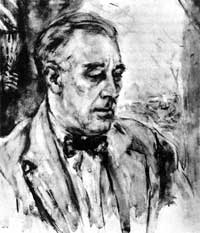 Roosevelt initiated the Manhattan Project, which eventually led to the development of the Atomic Bomb. Food and gasoline were rationed. Drives for rubber, scrap and even paper were conducted to support the war effort. Women took over the jobs formerly filled by the fighting men. Eleanor Roosevelt traveled about the country motivating these women with her wit and praise, while Franklin attended high level conferences with Joseph Stalin and Winston Churchill in places like Quebec, Malta, Tehran, and at Yalta. It was during the Yalta conference that the discussion that led to the formation of a United Nations was held. Roosevelt initiated the Manhattan Project, which eventually led to the development of the Atomic Bomb. Food and gasoline were rationed. Drives for rubber, scrap and even paper were conducted to support the war effort. Women took over the jobs formerly filled by the fighting men. Eleanor Roosevelt traveled about the country motivating these women with her wit and praise, while Franklin attended high level conferences with Joseph Stalin and Winston Churchill in places like Quebec, Malta, Tehran, and at Yalta. It was during the Yalta conference that the discussion that led to the formation of a United Nations was held.
Roosevelt's health had been deteriorating during the latter years of the War. The burden of the presidency took a toll on his body; but his mind persevered. Doctors constantly attended to him, doing what was necessary to keep him functioning. Roosevelt knew his days were numbered, but he desperately wanted to bring the War to a close. At Yalta the cold of the sea had made him ill, and upon his return, he went to Warm Springs, Georgia, for a much-needed rest. His wife was not with him, but was carrying his message from city to city when, finally, on April 12, 1945, Franklin Delano Roosevelt died without getting to see the peace.
|

